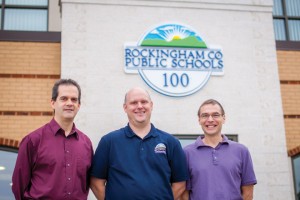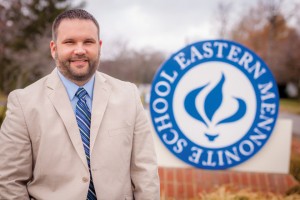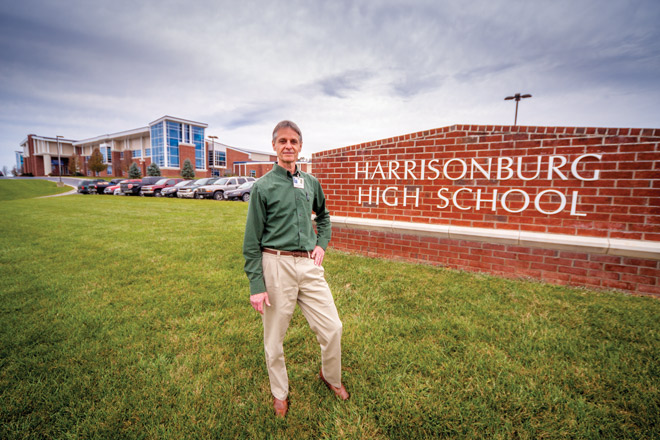If a computer glitch threatens to derail something like a state-required proficiency test at Harrisonburg (Virginia) High School, Craig Shoemaker’s phone is bound to start ringing.
“[Teachers] get anxious,” he said, chuckling. “I’m the one they try to get a hold of.”
A computer resource technician with Harrisonburg City Public Schools, Shoemaker (’78) likens his job during the school year to firefighting, swooping in to sort things out whenever someone can’t log into their computer or get their projector to behave. Shoemaker is responsible for one high school and one middle school in the city – though these days, he’s able to fix lots of problems remotely without leaving his office.
During the summers and other calmer times, Shoemaker also keeps the schools’ computers and other devices, like iPads, up-to-date and in good working order.
In neighboring Rockingham County Public Schools, Obe Hostetter ’00 has a slightly different role as an instructional technology resource teacher. Though he also gets involved in technological troubleshooting, he visits all the division’s 24 schools to train teachers on how to better use technology in their classrooms, and sometimes co-teaches technology-enhanced lessons with them. A recent example: teaching a kindergarten class how to scan QR codes with iPads.

“I enjoy the teaching part, seeing the kids getting excited [about technology],” said Hostetter, who spent his first five years after college teaching elementary and middle school before going down the technology path.
One of the tricky technology-related issues that comes up in school settings is the fact that after Hostetter’s lesson on QR codes, those kindergartners may well be more adept at using them than many of their teachers.
“They’re not as comfortable, because they have not grown up with it,” says Shoemaker, of teachers who began their careers before computers had so thoroughly infiltrated education.
While younger teachers, as a rule, don’t tend to be as intimidated by technology, there’s a flipside. Doug Moyer ’91, a systems technician for the Warren County (Virginia) Public Schools, tells of a young teacher whose Smart Board went out of service and was thrown into a tizzy by the prospect of resorting to primitive substitutes like the markerboard.
Moyer and Shoemaker both spent some time in the business world before getting into school technology, and both say they enjoy the general lower-pressure school atmosphere. Computer emergencies happen both places, but the stress and aggravation just usually aren’t as great in education.
“It has its moments of intensity, but it’s not nearly as great, and I appreciate that part of it,” said Shoemaker.
Mike Stoltzfus ’98 also began his IT career in private business, beginning with CMDS (now Jenzabar; see story p. 15) after graduating with a computer information systems degree. He then spent several years handling IT for Harman Construction, a company that has worked on numerous projects at EMU over the years, including the ongoing renovations of the Suter Science Center. While he worked for Harman, Stoltzfus also ran his own web hosting business on the side. One of his clients was Eastern Mennonite School (EMS), which created a full-time IT position and hired Stoltzfus to fill it in 2008.

With just under 400 students in grades K-12, the school’s IT needs are modest enough that Stoltzfus handles most technology-related issues (Andrew Gascho ’09 assists him, and teaches digital communication classes at EMS). Those range from systems maintenance to troubleshooting to repairs to keeping up with the rapidly changing digital world by planning things like a Chromebook-for-every-student initiative that the school is exploring.
“That’s something that really attracts me about working at a place where there isn’t a huge technology infrastructure,” Stoltzfus said. “I can be involved in all those different things…. I enjoy seeing the whole picture.”
(Since starting at EMS, Stoltzfus’s job has expanded well beyond that whole IT picture; now the director of business affairs, he also oversees school finances and a few other operational matters.)
There’s never a time when there’s not something new to check out. With a relatively tight budget to be conscious of, for example, Stoltzfus has been exploring opportunities offered by open source software.
“I really enjoy learning new things. That’s one thing that I’ve always enjoyed about technology – it’s always changing,” said Stoltzfus, who majored in computer information systems. “As you learn about things, you realize more and more how much you don’t know.”
Like Stoltzfus, Jon Harder ’82 also works as a technology generalist for a small school system, handling “pretty much anything to do with technology” for Mountain Lake (Minnesota) Public Schools.
In addition to all the usual school troubleshooting and software updating, Harder has been able to put his programming background to good use as the schools’ technology coordinator. When a need was identified for a computer-based method for staff to reserve rooms or vehicles to use, Harder couldn’t find existing software that fit the bill. Instead, he created his own web-based application that’s now in use. It’s the kind of thing that’s kept the job interesting for the past 14 years (prior to which, he was a software engineer in the Twin Cities).
“I guess I’m a real problem solver,” he said. “It’s always fulfilling to run into new challenges and figure out how to do something.”
When Harder was at EMU, tinkering with the mainframe computer that used to be in the old Administration Building or the few really early Apples that belonged to the Psychology Department, he had no clue that computers were going to become such a thing. The Internet as it exists now wasn’t something anyone could conceive of.
That makes it hard to hazard a guess as to what sorts of technologies people like him will be troubleshooting in schools in decades to come. Fewer keyboards and more spoken commands, he suspects.
Hostetter concurs on the voice-interfacing thing. 3-D printers are coming, too. Maybe “wearables” like Google Glass will make their way into classrooms eventually. Whatever it is, it’s bound to be something that seems hard to imagine right now.
“It is pretty amazing what all we can do now that just a couple years ago wasn’t possible,” he said.
